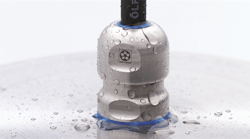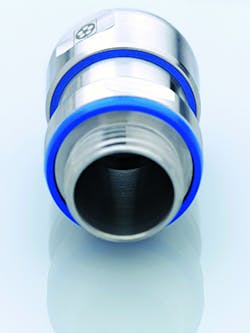Removing the human element can prevent several strains of bacteria from entering your food and beverage process, but even a fully automated system can unintentionally harbor a host of dangerous, even deadly, germs.
And even the smallest organism can disrupt your company for years to come. Just look at ice cream maker Blue Bell. The company's recent listeria epidemic over the past five years is believed to have contributed to three deaths, resulting in a massive recall and 1,450 layoffs last May.
Lapp Group has recently introduced the Skintop Hygienic cable gland series to U.S. OEMs and manufacturers, ensuring these components are part of the solution, and not the reason for a costly recall.
Ecolab certified and utilizing FDA approved material for direct food zone applications, the 316L stainless steel glands are designed to provide strain relief for cables, and to stand up to stringent washdown conditions. They also resist chemicals used in pharmaceutical applications.
"Whether it's listeria or salmonella, the rounded shape and smooth surfaces of the Skintop Hygienic protects against the build up of these pathogens" says U.S. product manager Sagar Patel. The IP68 and IP69-rated cable glands, ideal for robotics, conveyors and panels, resist bacteria and unwanted chemicals, in three ways: material, design, and precision fit.
The 316L stainless steel body is more corrosive resistant than typical nickel-plated brass cable glands, and tougher than a polyamide.
Rounded edges and no exterior threading discourage particles from sticking to the glands surface.
The precision fit closes any gaps that could potentially house splattered meat or dairy, eliminating a prime spot for microbes to hunker down.
Skintop Hygienic Cable Glands have FDA-approved elastomer.
Photo: Lapp Group
There are four sizes: M12, M16, M20, and M25.
One more thing, Patel notes, is that the FDA-approved elastomer is blue, a rare color for food, so it's easy to visually inspect that the entire gland is free of debris.
A recall can be a devastating event for any company, but trying to prevent one isn't the only benefit to upgrading to the pricier glands. When a nickel-plated brass gland rusts and needs to be replaced, the machine needs to be shut down and production stops. You may need to do a lockout/ tagout, costing more time and resources.
"Reducing downtime and maintaining sanitary design and construction is a big upside here," Patel explains. "This down time can be very critical, costing tens of thousands of dollars a minute depending on the specific industry. The food and beverage and pharmaceutical industries are equally susceptible to heavy costs when they have to shut down, even if it is for a preventative measure. The investment in Skintop Hygienic cable glands is far outweighed by the safety benefits that are realized"












